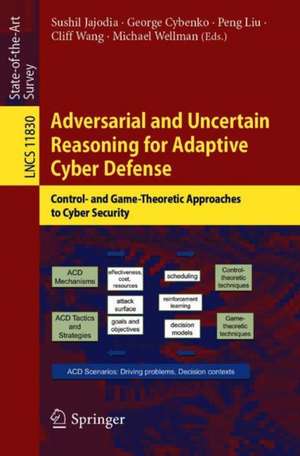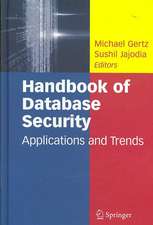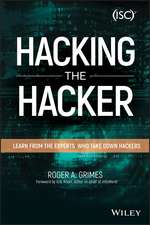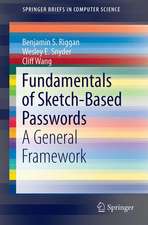Adversarial and Uncertain Reasoning for Adaptive Cyber Defense: Control- and Game-Theoretic Approaches to Cyber Security: Lecture Notes in Computer Science, cartea 11830
Editat de Sushil Jajodia, George Cybenko, Peng Liu, Cliff Wang, Michael Wellmanen Limba Engleză Paperback – 2 sep 2019
The 10 papers included in this State-of-the Art Survey present recent advances made by a large team of researchers working on the same US Department of Defense Multidisciplinary University Research Initiative (MURI) project during 2013-2019. This project has developed a new class of technologies called Adaptive Cyber Defense (ACD) by building on two active but heretofore separate research areas: Adaptation Techniques (AT) and Adversarial Reasoning (AR). AT methods introduce diversity and uncertainty into networks, applications, and hosts. AR combines machine learning, behavioral science, operations research, control theory, and gametheory to address the goal of computing effective strategies in dynamic, adversarial environments.
Din seria Lecture Notes in Computer Science
- 20%
 Preț: 571.63 lei
Preț: 571.63 lei - 20%
 Preț: 336.71 lei
Preț: 336.71 lei - 20%
 Preț: 333.46 lei
Preț: 333.46 lei - 20%
 Preț: 662.76 lei
Preț: 662.76 lei - 20%
 Preț: 330.23 lei
Preț: 330.23 lei - 20%
 Preț: 747.79 lei
Preț: 747.79 lei - 20%
 Preț: 438.67 lei
Preț: 438.67 lei - 20%
 Preț: 369.12 lei
Preț: 369.12 lei - 20%
 Preț: 315.76 lei
Preț: 315.76 lei - 20%
 Preț: 584.40 lei
Preț: 584.40 lei - 20%
 Preț: 148.66 lei
Preț: 148.66 lei - 20%
 Preț: 122.89 lei
Preț: 122.89 lei - 20%
 Preț: 315.18 lei
Preț: 315.18 lei - 20%
 Preț: 256.26 lei
Preț: 256.26 lei - 20%
 Preț: 1040.03 lei
Preț: 1040.03 lei - 20%
 Preț: 504.56 lei
Preț: 504.56 lei -
 Preț: 402.62 lei
Preț: 402.62 lei - 20%
 Preț: 346.40 lei
Preț: 346.40 lei - 20%
 Preț: 301.94 lei
Preț: 301.94 lei - 20%
 Preț: 237.99 lei
Preț: 237.99 lei - 5%
 Preț: 365.59 lei
Preț: 365.59 lei - 20%
 Preț: 309.89 lei
Preț: 309.89 lei - 20%
 Preț: 321.95 lei
Preț: 321.95 lei - 20%
 Preț: 310.25 lei
Preț: 310.25 lei - 20%
 Preț: 334.68 lei
Preț: 334.68 lei -
 Preț: 373.56 lei
Preț: 373.56 lei - 20%
 Preț: 172.68 lei
Preț: 172.68 lei - 20%
 Preț: 1386.07 lei
Preț: 1386.07 lei - 20%
 Preț: 315.76 lei
Preț: 315.76 lei - 20%
 Preț: 1003.66 lei
Preț: 1003.66 lei - 20%
 Preț: 444.17 lei
Preț: 444.17 lei - 20%
 Preț: 567.60 lei
Preț: 567.60 lei - 20%
 Preț: 632.22 lei
Preț: 632.22 lei - 17%
 Preț: 360.18 lei
Preț: 360.18 lei - 20%
 Preț: 538.28 lei
Preț: 538.28 lei - 20%
 Preț: 335.08 lei
Preț: 335.08 lei - 20%
 Preț: 307.68 lei
Preț: 307.68 lei - 20%
 Preț: 343.16 lei
Preț: 343.16 lei - 20%
 Preț: 641.78 lei
Preț: 641.78 lei - 20%
 Preț: 579.56 lei
Preț: 579.56 lei - 20%
 Preț: 1053.45 lei
Preț: 1053.45 lei - 15%
 Preț: 568.74 lei
Preț: 568.74 lei -
 Preț: 389.47 lei
Preț: 389.47 lei - 20%
 Preț: 333.46 lei
Preț: 333.46 lei - 20%
 Preț: 607.38 lei
Preț: 607.38 lei - 20%
 Preț: 326.97 lei
Preț: 326.97 lei
Preț: 380.35 lei
Preț vechi: 475.44 lei
-20% Nou
Puncte Express: 571
Preț estimativ în valută:
72.78€ • 76.57$ • 60.26£
72.78€ • 76.57$ • 60.26£
Carte tipărită la comandă
Livrare economică 14-28 ianuarie 25
Preluare comenzi: 021 569.72.76
Specificații
ISBN-13: 9783030307189
ISBN-10: 3030307182
Pagini: 263
Ilustrații: VII, 263 p. 120 illus., 45 illus. in color.
Dimensiuni: 155 x 235 mm
Greutate: 0.39 kg
Ediția:1st ed. 2019
Editura: Springer International Publishing
Colecția Springer
Seriile Lecture Notes in Computer Science, Security and Cryptology
Locul publicării:Cham, Switzerland
ISBN-10: 3030307182
Pagini: 263
Ilustrații: VII, 263 p. 120 illus., 45 illus. in color.
Dimensiuni: 155 x 235 mm
Greutate: 0.39 kg
Ediția:1st ed. 2019
Editura: Springer International Publishing
Colecția Springer
Seriile Lecture Notes in Computer Science, Security and Cryptology
Locul publicării:Cham, Switzerland
Cuprins
Overview of Control and Game Theory in Adaptive Cyber-Defenses.- Control Theoretic Approaches to Cyber-Security.- Game-Theoretic Approaches to Cyber-Security: Issues and Challenges and Results.- Reinforcement Learning for Adaptive Cyber Defense against Zero-day Attacks.- Moving Target Defense Quantification.- Empirical Game-Theoretic Methods for Adaptive Cyber-Defense.- MTD Techniques for Memory Protection against Zero-Day Attacks.- Adaptive Cyber Defenses for Botnet Detection and Mitigation.- Optimizing Alert Data Management Processes at a Cyber Security Operations Center.- Online and Scalable Adaptive Cyber Defense.
Textul de pe ultima copertă
Today’s cyber defenses are largely static allowing adversaries to pre-plan their attacks. In response to this situation, researchers have started to investigate various methods that make networked information systems less homogeneous and less predictable by engineering systems that have homogeneous functionalities but randomized manifestations.
The 10 papers included in this State-of-the Art Survey present recent advances made by a large team of researchers working on the same US Department of Defense Multidisciplinary University Research Initiative (MURI) project during 2013-2019. This project has developed a new class of technologies called Adaptive Cyber Defense (ACD) by building on two active but heretofore separate research areas: Adaptation Techniques (AT) and Adversarial Reasoning (AR). AT methods introduce diversity and uncertainty into networks, applications, and hosts. AR combines machine learning, behavioral science, operations research, control theory, and game theory to address the goal of computing effective strategies in dynamic, adversarial environments.
The 10 papers included in this State-of-the Art Survey present recent advances made by a large team of researchers working on the same US Department of Defense Multidisciplinary University Research Initiative (MURI) project during 2013-2019. This project has developed a new class of technologies called Adaptive Cyber Defense (ACD) by building on two active but heretofore separate research areas: Adaptation Techniques (AT) and Adversarial Reasoning (AR). AT methods introduce diversity and uncertainty into networks, applications, and hosts. AR combines machine learning, behavioral science, operations research, control theory, and game theory to address the goal of computing effective strategies in dynamic, adversarial environments.
Caracteristici
Presents a new class of technologies that help prevent cyber attacks Features research by international experts Synthesizes recent advances


























